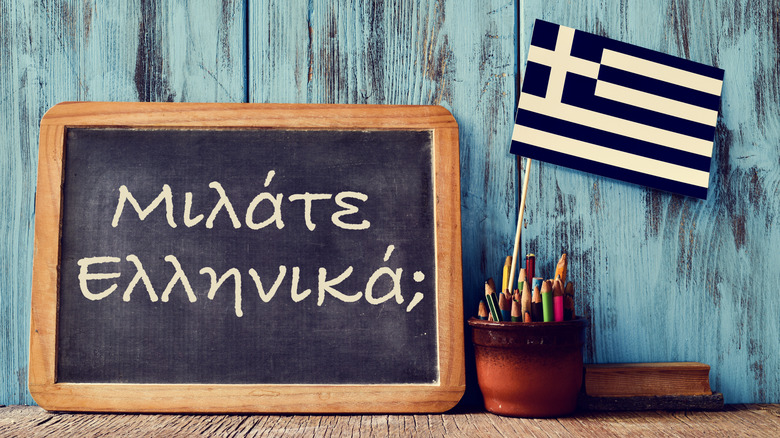The Most Important Greek Words And Phrases To Know Before A Trip To Greece
Whether you're a history buff, fan of lounging on the beach, foodie, or just a lover of beautiful islands, Greece is the perfect destination. From the Parthenon in Athens and other ancient sites like Delphi to the ruins of the palace at Knossos in Crete, Greece is a must-visit for so many reasons. One thing that may stop some travelers from booking a trip, however, is the language. Greek isn't the easiest language to learn, particularly because it has a different alphabet than English. (In fact, the word "alphabet" comes from the first two Greek letters, "alpha" and "beta.") You can, of course, use an app like Google Translate; however, we're here to help with some Greek words and phrases that you can use while you're there.
In more touristy areas, you'll likely find people who speak English, but out of respect for the country and the culture of the place you're visiting, it's polite and kind to learn as much as you can and at least give it a shot. While you're probably not going to spend the 44 weeks of learning that it takes to gain mastery over the language, there is a lot you can take in before you depart for your Grecian vacation.
Getting to know you (in Greek)
There are 24 letters in the Greek alphabet, and while some of them look familiar, many are pronounced in a different way. For instance, the lowercase letter "v" is pronounced as an "n" in English, though the uppercase is written as "N." Another thing to note is that, in Greek, a semicolon indicates a question rather than the English question mark. If you do decide to learn the alphabet's pronunciation and you see a word, note that the accented syllable is the one that is emphasized. You may see Greek words and place names written out in our alphabet, but note that you'll often see different spellings for the same word, or just slightly different ways of pronouncing things. That said, here are some helpful phrases in Greek for when you meet someone.
To say "hello," you'll say "Γεια σου" (pronounced "Yah-soo"). You can also simply use "Γεια" ("Yah"). To say "good morning," you say, "Καλημέρα" ("Kah-lee meh-rah") and "good night" is "Καληνύχτα" ("Kah-lee nic-tah"). "How are you?" can be asked in two ways. You can say, "Τι κάνεις;" (note the semicolon) ("Tee kah-nees") or "Πώς είσαι;" (poohs ee-say). To answer, "I'm fine, thank you," say, "Καλά, ευχαριστώ" ("Kah-lah Ef-char-ee-stow"). ("ευχαριστώ" means "thank you.") To get someone's attention you can say, "Συγγνώμη" ("Sig-noh-mee"), which also means "sorry." "Nice to meet you" is, "Χάρηκα" ("Pah-ree-kah"). To say both "please" and "you're welcome," say, "Παρακαλώ" ("Pah-rah-kah-low").
More Greek for when you're out and about
The sign in the pic above means, "Do you speak Greek?" (Note the semicolon.) To ask if someone speaks English, say, "Μιλάτε Αγγλικά;" ("Mee-lah-tay Ang-leh-kah" or swap "Greek" for "Ελληνικά" or "Eh-len-ee-kah"). "Yes" and "no" can be confusing, so it's worth practicing. That's because "Yes" is "Ναι" ("nay"), which sounds like a negative in English. "No" is "Όχι" ("oh-hee"), which looks like "okay." You'll get used to it. To introduce yourself, say, "My name is ... " or "Με λένε ... " ("Me leh-neh ... ").
If you make some new Greek friends, you can throw in a "Τι λέει;" ("Tee-lei"), which means "What's up?" To call someone, "dude," say, "ρε φίλ" ("reh-fee-leh"). We're throwing in one sort of curse word, though people do use it with friends and somewhat affectionately. (It's also said non-stop in the video game "Assassin's Creed: Odyssey," so it may sound familiar if you play.) That word is, "μαλάκα" (mah-lah-kah) which sort of means "jerk" or something a little harsher. Don't use it with people you don't know, but you'll likely hear it around. "Cheers" is "Γεια μας" ("Yah-mas").
A useful sentence to know is,"Πού είναι η τουαλέτα;" ("Poh ee-nay ee tua-leh-tah"), which means, "Where's the bathroom?" "Πόσο κάνει ... ;" ("Po-so kah-nee") is "How much is ... ?" Finally, "Goodbye" is "Αντιο σας" ("An-tee-oh sas"). If this inspired you to learn more, there are plenty of language apps out there for first-time learners. Καλό ταξίδι (Kah-low tax-ee-di), which means, have a great trip.


